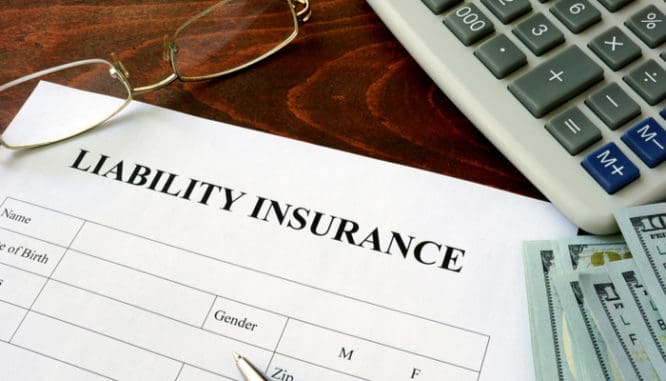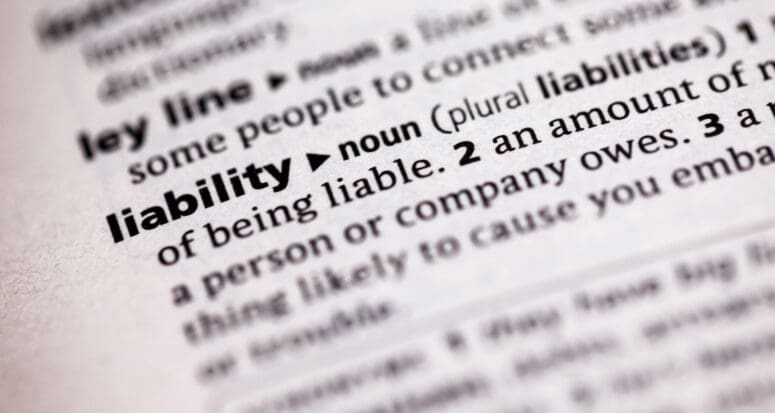What Is Homeowner Liability Insurance (And Whether You Need More)
- Published on
- 4 min read
-
 Kim Dinan Contributing AuthorClose
Kim Dinan Contributing AuthorClose Kim Dinan Contributing Author
Kim Dinan Contributing AuthorKim Dinan is a writer, journalist and author. She's the outdoor news editor at Blue Ridge Outdoors and writes regularly for her local paper in Asheville, NC, covering everything from the necessity of home inspections to trends in the local economy. Kim is also the author of "The Yellow Envelope," a memoir about the time she sold her house and traveled around the globe.
Your home is one of your greatest assets — but are you protected if someone were to sustain an injury on your property?
If your dog bites someone in your home, there is an accident in your backyard pool, or a visitor trips and falls down your stairs, you could be sued. Sadly, if you lost a lawsuit where damages amount to millions of dollars, you could lose your savings and the equity in your home (although you can’t lose the money you’ve socked away in your IRA or 401K.)
Liability insurance is wrapped into your homeowner’s insurance policy, but is that basic coverage enough to protect you?
We’re taking a look at homeowner’s liability insurance so you can determine whether it makes sense to get supplemental liability coverage in addition to what’s included in your homeowner’s policy.

What is homeowner liability insurance?
Homeowner’s liability insurance is insurance that helps protect you against lawsuits brought on by injury or property damage caused by you, your family members, or your pets.
The standard homeowner’s liability policy is designed to cover the cost of defending you in court — and any damages you must pay — should someone injure themselves at your home and sue you, says the Rocky Mountain Insurance Information Association.
Medical coverage is also included with most homeowner policies; medical coverage reimburses basic medical bills that result from a liability claim. The standard homeowner’s policy carries a medical coverage limit of either $1,000 or $5,000. This coverage would, for example, pay the medical expenses for a visitor who was bitten by your dog or who sustained a minor injury on your property, explains the Rocky Mountain Insurance Information Association website.
The basic liability limit for most homeowner’s policies is $100,000 for property damages or injuries. Higher coverage amounts are available and, increasingly, it is recommended that homeowners purchase at least $300,000 to $500,000 worth of liability coverage, says the Insurance Information Institute.
Unlike the other types of coverage in your homeowner’s policy, liability insurance doesn’t have a deductible. That means there is no out-of-pocket cost you’re required to pay before the insurance company begins paying for losses.
Why do homeowners need liability insurance?
Unfortunately, we live in a litigious society. Homeowners need liability insurance to protect them against an event on their property that causes damages or injuries to someone else.
Now that you own a home, you have an asset that is worth a lot of money. If you accidentally hurt someone, your ownership of that home could suddenly be in danger. “The last thing you want is to have a birthday party for your child, and another kid comes over and gets bitten by your Chihuahua, and then you get sued,” says Michael Constantine, a real estate agent who works with 68% more single-family homes than the average agent in Pasco County, Florida. “It’s always better to be safe than sorry.”
Homeowner’s liability insurance ensures that if there is ever an accident at your home that leads to a lawsuit, you won’t be financially wiped out in the aftermath.

What does the liability insurance baked into a homeowner’s policy usually include?
According to insurance provider Allstate, your basic liability policy covers medical bills for visitors who have an accident in your home as a result of negligence (you failed to fix a guardrail, for example); pain and suffering endured by the person injured in your home; lost wages if the person injured is unable to return to work; death benefits, should the unthinkable happen and the accident turn fatal; and legal expenses if you are sued.
Some policies may also cover damages from a covered loss that happens away from home — for example, if you accidentally cause damage to your hotel room.
Exclusions include car accidents, injuries that are intentionally inflicted (you push someone down the stairs, for example), and your own (or other household members’) injuries.
The liability insurance in your homeowner’s insurance policy covers the liability of anyone who lives in your house, including family members and children, though it may not cover unrelated tenants. So if you or your family members accidentally hurt someone, your liability insurance should help you.
If you’re renting out rooms or have more extended family living in your home, check with your insurance agent to confirm the extent of your coverage for those living in the home.

How can you increase your liability coverage?
If you feel you want or need the added protection, there are a few ways to increase your liability coverage.
The first way is to simply call your insurance agent and increase your coverage limit, bumping it from the standard $100,000 to an amount that makes the most sense for you. Options generally include $250,000 of coverage, $500,000 of coverage, or $1 million of coverage. The higher your limit, the higher your premium will likely be.
Another option is to purchase an umbrella policy. An umbrella policy increases your coverage limit and can be applied across all your insurance policies. For example, if you have insurance on your house, car, and boat, your umbrella policy will cover them all.
Umbrella insurance policies are executed once you’ve reached your homeowners liability limits. In other words, if you have a $100,000 liability policy under your homeowner’s insurance, but you’re obligated to pay out $200,000 as the result of a lawsuit, your umbrella policy will kick in the additional $100,000.
Bodily injury, personal injury, property damage, and landlord liability are all usually covered under an umbrella policy. The policy will typically cover you and the other family members in your household.
Angie Cole, a top-selling real estate agent in Raleigh, North Carolina, says that, personally, she and her husband carry an umbrella policy on their property. “Our insurance agent chatted with us and recommended an umbrella policy; then we talked to our closest friends and they all had one, too,” she says.
Terry Bunch, a real estate agent with 16 years of experience in Naperville, Illinois, says that he would recommend umbrella coverage to his clients if “they had a personal need for it, or if their home has attractive nuisances, like a pool.” Other insurance professionals advise homeowners to purchase an umbrella policy if you have teenage drivers in the household.
Umbrella policies are usually sold in $1 million increments and typically cost about $150 a year for each $1 million of coverage up to $5 million.

When should you consider increasing your liability coverage?
Although liability insurance is wrapped up in your homeowners insurance policy already, you may want to consider purchasing supplemental liability insurance.
“Additional liability insurance is one of those policies that is inexpensive, and there is a lot of value behind it,” says Cole.
While it can never hurt to increase your liability coverage, there are some instances where having extra coverage is a no-brainer.
“If you have a pool, or large dogs — or any dog, for that matter — you always want to protect yourself,” says Constantine. “You should weigh your options and decide what’s important to you.”
Other risks that may lead you to consider extra liability insurance include owning a trampoline or renting out part of your property on Airbnb or another home-sharing website.
Another good time to think about increasing your liability coverage is when you have accumulated or acquired a lot of assets. You don’t want to risk the things you’ve worked hard to earn because your liability coverage isn’t high enough. “Any time you have a decent net worth, it is smart to put an additional liability policy in place,” says Cole.
For example, if you own several nice cars, a boat, and a house, your policy limits should be high enough to collectively cover everything that you own. If that’s not the case, you should consider an umbrella policy that will stretch to cover your high-priced assets.
If you’re unsure whether you need additional homeowner’s liability insurance, Kiplinger has a calculator to help you determine how much umbrella insurance coverage you need.
And if you’re on the fence, Cole has this advice: “Extra coverage is a common thing to put in place,” she says. “And in the grand scheme of things, it is usually worth it, because the cost is minimal.”
Header Image Source: (Shutterstock.com/Contimis Works)
